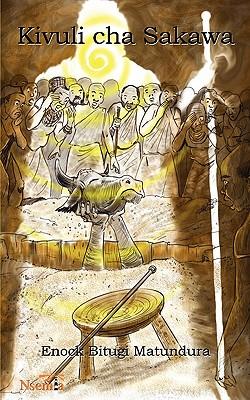Kivuli cha Sakawa (Sakawa's Ghost) , written in Kiswahili, the major lingua franca in the East African region, is a story about one of Africa's legendary heroes who was at the forefront in the battle against colonialism and its evils. Legend has it that he was a seer and that many of his predictions have come to pass.
In this this story, Sakawa finds himself at crossroads following the death of his father, a prominent leader in his own right. Conservative elders in his community who feel threatened by this youngster destined to be a great leader fight him tooth and nail to subdue his shinning star. Will they succeed?
Sakawa Ng'iti indeed existed and lived among the Abagusii community in western Kenya at the turn of 19th Century (1800). The unfolding episode in this book did indeed take place, although probably in slightly a different way. By chronicling this episode, the author gives the story a new lease of artistic life and offers opportunity for others to comments and/or offer versions of the story as they understand it.
Here is what others say about the work:
"The publication of Kivuli cha Sakawa is a very important step in developing Swahili literature in general and the preservation of African culture in particular for the benefit of future generations....." - Dr Mwenda Mukuthuria, Director, Board of Postgraduate Studies - Chuka University College, Kenya.
"Apart from reminding us abaout Sakawa - the Gusii legend and cultural hero,, b> Kivuli cha Sakawa is an important contribution towards the efforts of preserving the culture of Abagusii community that lives in south western Kenya." - Prof Kefa Otiso, Department of Geography, University of Bowling Green, Bowling Green, OH, USA.
About the Author
His anthologized short stories include Mrithi Nini Wanangu? [KLB], Shetani Hana Hatia [Focus] na Giza la Kumi Kumi [Phoenix]. Matundura has also contributed chapters in Kiswahili scholarly books and journals. He deliberately writes in Kiswahili because he feels it is an important African language.Enock Bitugi Matundura was born in Bomoseri village, Gucha District in 1973 in Kenya. He grew up in Kericho and went to Kipketer Primary School. He later joined the Starehe Boys' Centre and School for his secondary education before studying for a degree in education at Moi University.
Thereafter, Matundura worked briefly as a news editor for the national broadcaster, Kenya Broadcasting Corporation before going to graduate school where he attained a Master of Arts degree in Swahili studies at the University of Nairobi. He had a short stint at Nation Media Group before venturing into teaching at local universities.
With a number of children's books to his credit, Bitugi Matundura has carved a niche in Kenya's children's literature. His narratives are informed by a rare appeal to cosmopolitan and trans-ethnic tolerance. His book, Sitaki Iwe Siri (Longhorn Publishers, Nairobi) won the second place in Jomo Kenyatta Prize for Literature Award, 2009. This is the highest and most coveted literary prize in East and Central Africa.
His other works include Mkasa wa Shujaa Liyongo (2001) [Phoenix], Mwepesi wa Kusahau (2005) [Phoenix], Masagisa na Zimwi Mbilikimo (2007) [Phoenix], Fahali Mtoboa Siri (2008) [Focus], Maadui wa Maria (2008) [Vide Muwa], Jumamosi ya Mkosi (2008) [Phoenix], Kisa Cha Nyange (2009) [E.A.E.P], Mamba Mnafiki (2009) [E.A.E.P] and Mbwa na Sungura (2009) [E.A.E.P], among others.
